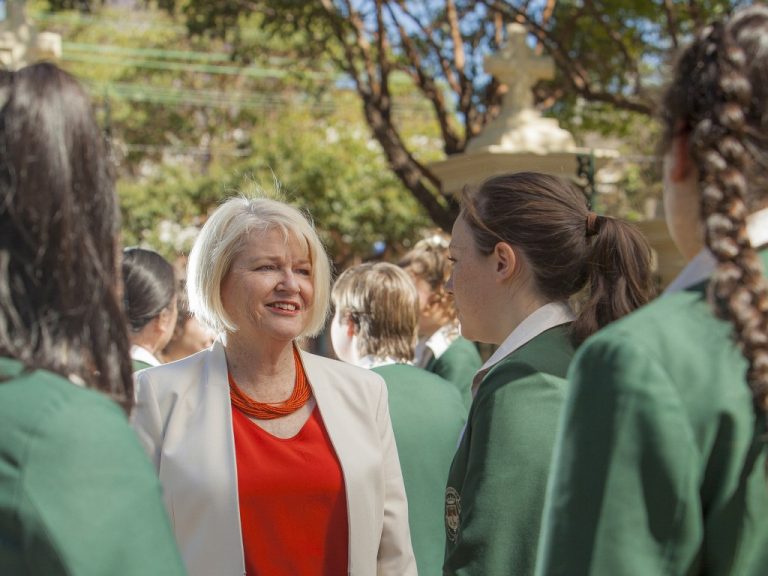“All Dominican education should be marked by the quest for academic excellence, by fidelity to our intellectual and spiritual traditions and by concern for those in the society where we labour. Above all, we should be known for nurturing our students, fostering their love of knowledge, sharing their dreams, cultivating their character and shaping their hopes.“
– Philip Smith OP
This quote from Philip Smith OP on Dominican education captures our vision for learning at Santa Sabina College, and this remains a constant despite the inevitable changes of curriculum, assessment and policies. You will read much in the media about the new HSC syllabuses due for implementation in Year 11 2018, and their intent to ensure ‘depth not breadth, mastery not easy marks, concepts not context’ (SMH 21 Feb). If this proves to be the case, then we welcome their introduction and see the concern for intellectual depth, particularly in senior study, as completely consistent with the principles of a Dominican education.
However we also need to be discerning, and critique the ‘marketing’ of the changes as ‘back to basics’. We are educating students for a very different workforce and world than has previously existed, and a nostalgic look at what are considered ‘basics’ is not sufficient for education today. Syllabus documents are important but what makes the positive difference for students are quality teachers. We need highly educated, expert teachers who continue to learn, grow and adapt, and who love what they do. While ‘lifelong learning’ has become something of a cliché, it must be a core priority for every educator. Our College strategy focus on ‘exceptional people’ is aspirational, and will sometimes elude us. But we are intentional about recruiting and supporting the very best teachers.
While more detailed information will be regularly provided to parents through information nights and publications, such as Veritas Voice, I will address the ‘angst’ around NAPLAN (National Assessment Program Literacy and Numeracy) that is possibly fuelling unnecessary enrolments into tutoring colleges. Students who graduate from school after 13 years of education are reasonably expected to demonstrate competent literacy and numeracy skills. Last year’s NSW Education Minister, Adrian Piccoli, announced that such competency would be benchmarked against the Australian Core Skills Framework (ACSF) Level 3, a nationally agreed standard of functional literacy and numeracy.
This would need to be achieved by students at some stage throughout Years 10-12 in order to qualify for a Higher School Certificate. Where the issue of NAPLAN has become mired in all of this, is that it was also announced that if students achieved a Band 8 or more in the Year 9 NAPLAN test in the reading, writing and numeracy components, they will have satisfied the minimum literacy and numeracy requirements. In a sense they will have ‘pre-qualified’ before commencing their senior years.
Will all students in Year 9 at the College (or at any other school) achieve a Band 8 in NAPLAN this year? Not likely, and we fully expect this. Those who do not will be identified and supported to ensure that these minimum requirements are met throughout the course of Years 10-12. I believe there is a real risk of inflating the significance of this one measure in Year 9 unnecessarily if we see it as a ‘high-stakes’ test. The purpose of NAPLAN is to diagnose literacy and numeracy strengths and weaknesses, and to help schools ensure the appropriate support. It tells us little about students’ overall academic achievements, let alone other very significant educational outcomes such as engagement, participation, capacity to learn from mistakes, to collaborate and to take risks with learning. The more we raise the stakes of NAPLAN, the more we forget about the real purpose of learning. We need to get on with making learning engaging, relevant, challenging and (dare I say) FUN!
An additional focus of our College strategy is to have an ‘exceptional presence’ in the local and wider world. This relates in part to the way we are perceived, and a school uniform is a very important marker of presence. The College Board and I believe it is time to review the current uniform K-12 in line with our strategy. A representative committee of staff, parents and students is currently being formed, with the intention of bringing together expertise, but also representation, from different parts of the College. Eileen Fisher and Meryl Waters, our long-standing Uniform Shop managers, will help guide us through the review process as they have done with previous uniform changes. The review will consider a number of factors that influence the design of a contemporary uniform including: climate, gender, consistency and cost. The process will not be rushed, and a realistic timeframe will be one of the first things that the committee will discuss. I look forward to the many opportunities to discuss and share the ideas brought forward by the committee.
I also look forward to visiting our Year 7s on camp at Tallong today. Our outdoor education program, along with co-curricular activities, is a vital part of every student’s Santa Sabina College education.
Thank you to all the families who were able to attend our House Masses over the last three weeks. Our Gospel message at each of these Masses was a simple but profound one of love. And we know that the world needs a lot more love at the moment. So as Christians, as Dominicans, this is the Gospel we must proclaim:
“Teacher, which commandment in the law is the greatest?” Jesus said to him, “‘You shall love the Lord your God with all your heart, and with all your soul, and with all your mind.’ This is the greatest and first commandment. And a second is like it: ‘You shall love your neighbour as yourself.’ On these two commandments hang all the law and the prophets.”
– Matthew 22:36-40
Dr Maree Herrett



